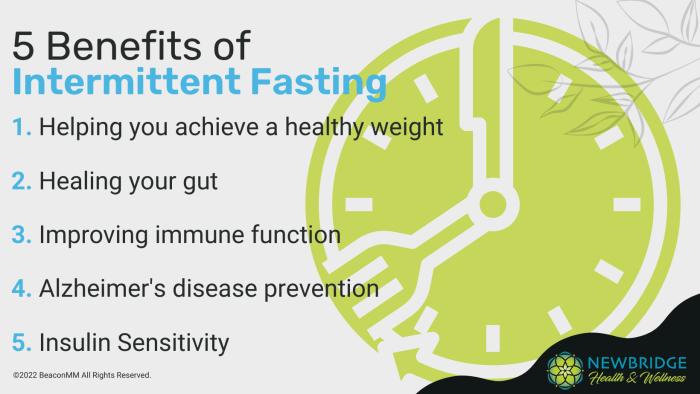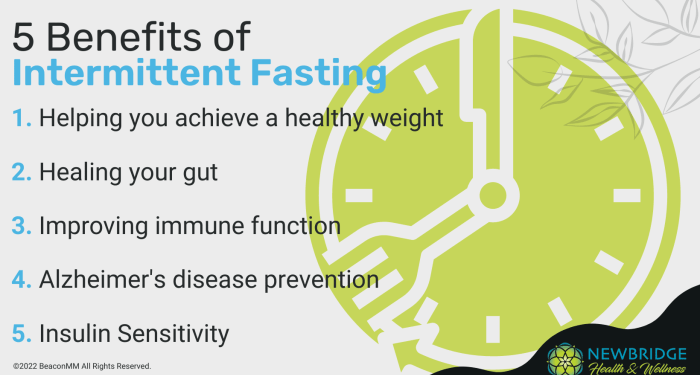Unlocking the secrets of intermittent fasting can lead to a plethora of health benefits that go beyond just weight loss. Dive into the world of intermittent fasting and discover how this practice can revolutionize your well-being.
Intermittent fasting isn’t just a trend; it’s a lifestyle change that has the potential to reshape your body and mind.
Introduction to Intermittent Fasting
Intermittent fasting is an eating pattern that cycles between periods of fasting and eating. It doesn’t focus on what you eat, but rather when you eat. This approach does not restrict calories, but rather when you should consume them.
Types of Intermittent Fasting Schedules
- 16/8 method: Involves fasting for 16 hours and eating within an 8-hour window each day.
- 5:2 diet: Involves eating normally for 5 days a week and restricting calorie intake for 2 non-consecutive days.
- Alternate-day fasting: Involves alternating between days of normal eating and days of either fasting or consuming very few calories.
Basic Principles of Intermittent Fasting
Intermittent fasting works by changing the body’s hormone levels to make stored body fat more accessible for energy. During fasting periods, insulin levels drop, which facilitates fat burning. This process can lead to weight loss and various health benefits.
Health Benefits of Intermittent Fasting
Intermittent fasting has gained popularity not just for weight loss, but also for its numerous health benefits. Let’s explore some of the key advantages it offers.
Weight Loss
Intermittent fasting can be an effective tool for weight loss due to the restricted eating window. By consuming fewer calories in a shorter time frame, it can lead to a calorie deficit, promoting fat loss. Additionally, fasting periods can increase the body’s metabolic rate, further aiding in weight loss efforts.
Improved Metabolic Health
Intermittent fasting has been shown to have positive effects on metabolic health. It can help lower insulin levels, reduce inflammation, and improve various risk factors for heart disease. Fasting periods also promote autophagy, a process that helps cells repair and regenerate, contributing to overall metabolic health.
Enhanced Insulin Sensitivity
One of the key benefits of intermittent fasting is its impact on insulin sensitivity. Fasting periods can help lower blood sugar levels and improve insulin function, which is crucial for reducing the risk of type 2 diabetes. By allowing the body to regulate insulin more effectively, intermittent fasting can have long-term benefits for metabolic health.
Effects of Intermittent Fasting on Cellular Repair
Intermittent fasting has been shown to have a significant impact on cellular repair processes within the body. One of the key mechanisms through which this occurs is autophagy, a cellular process that involves the removal of damaged or dysfunctional components within cells.
Autophagy and Cellular Repair
Autophagy is a crucial process that helps cells remove and recycle damaged organelles and proteins. During fasting periods, the body switches to a state where it begins to break down and remove these dysfunctional components, allowing for the regeneration of healthy cells.
This process is essential for maintaining cellular health and function.
Impact on Gene Expression and Longevity
Intermittent fasting has been linked to changes in gene expression that are associated with longevity. Fasting triggers pathways that promote cellular stress resistance and DNA repair, ultimately leading to increased lifespan. By activating these genes, intermittent fasting may help protect against age-related diseases and promote overall health and well-being.
Reducing Inflammation and Oxidative Stress
In addition to promoting cellular repair, intermittent fasting has been shown to reduce inflammation and oxidative stress in the body. By decreasing these harmful processes, fasting can help lower the risk of chronic diseases such as heart disease, diabetes, and cancer.
This anti-inflammatory effect is crucial for maintaining optimal health and preventing age-related decline.
Intermittent Fasting and Brain Health
Intermittent fasting not only benefits the body but also plays a crucial role in promoting brain health. The practice of intermittent fasting has shown promising results in enhancing cognitive function and supporting overall brain health.
Cognitive Benefits of Intermittent Fasting
Intermittent fasting has been linked to improved cognitive function, including enhanced focus, clarity, and memory. By giving the brain a break from constant digestion, intermittent fasting allows for increased production of brain-derived neurotrophic factor (BDNF), a protein that promotes the growth and connection of nerve cells in the brain.
This process is essential for learning, memory, and overall brain health.
Intermittent Fasting and Neuroplasticity
Intermittent fasting has been found to support neuroplasticity, the brain’s ability to adapt and reorganize itself by forming new neural connections. This process is crucial for learning new skills, adapting to changes, and maintaining cognitive function as we age. By promoting neuroplasticity, intermittent fasting may help protect against cognitive decline and improve overall brain function.
Reduced Risk of Neurodegenerative Diseases
Studies have suggested that intermittent fasting could potentially reduce the risk of neurodegenerative diseases such as Alzheimer’s and Parkinson’s. The practice of intermittent fasting may help reduce inflammation, oxidative stress, and the accumulation of toxic proteins in the brain, which are all factors associated with neurodegenerative diseases.
Additionally, intermittent fasting has been shown to promote autophagy, a process that removes damaged cells and proteins, further supporting brain health and reducing the risk of cognitive decline.
Intermittent Fasting and Heart Health

Intermittent fasting has been shown to have positive effects on cardiovascular health, impacting various aspects such as cholesterol levels, blood pressure, and reducing the risk of heart disease.
Effects on Cholesterol Levels
Intermittent fasting can help improve cholesterol levels by reducing LDL (bad cholesterol) and triglycerides, while increasing HDL (good cholesterol). This balance is crucial in maintaining heart health and reducing the risk of cardiovascular diseases.
Impact on Blood Pressure
Studies have indicated that intermittent fasting can lead to a decrease in blood pressure, which is a significant risk factor for heart disease. By regulating blood pressure levels, fasting can contribute to overall heart health and reduce the likelihood of hypertension.
Reducing Risk of Heart Disease
One of the potential benefits of intermittent fasting is its ability to lower the risk of heart disease. By improving cholesterol profiles, reducing blood pressure, and promoting weight loss, intermittent fasting can have a protective effect on the heart and cardiovascular system.
Closing Notes
In conclusion, intermittent fasting is not just about skipping meals; it’s a powerful tool that can enhance your health in numerous ways. Embrace this practice and witness the transformative effects it can have on your overall well-being.
Question Bank
Can intermittent fasting help with weight loss?
Yes, intermittent fasting can aid weight loss by promoting fat burning and reducing calorie intake.
How does intermittent fasting impact brain health?
Intermittent fasting may support brain function by enhancing neuroplasticity and reducing the risk of neurodegenerative diseases.
What are the potential benefits of intermittent fasting on heart health?
Intermittent fasting can improve cardiovascular health by reducing cholesterol levels and blood pressure, thus lowering the risk of heart disease.


